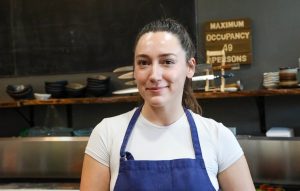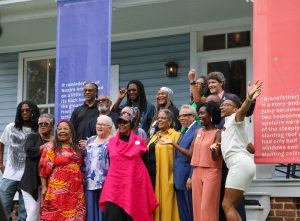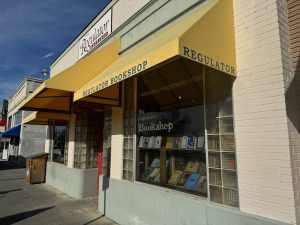On a bright Sunday afternoon in April, a group ranging from teenagers to people in their 40s, all dressed in black T-shirts and baseball caps, crowded around a coffee stand outside of Durham Athletic Park. The group served coffee and homemade chocolate chip cookies to people attending a talent show at the park while nearby, their teammates lounged in the sun, exchanged high-fives and danced along to the song “Wannabe” blasting from the loudspeaker. All were clad in black T-shirts emblazoned with the words “B3 Coffee.”
By the end of the event, the cash box for the B3 Coffee stand was brimming, and the team had served three large vats of fresh brewed coffee.
The event was a typical one for B3 Coffee, a nonprofit that hires people with and without mental disabilities and has pop-up coffee events all over the Triangle area.
B3 began as a partnership with a student organization at the University of North Carolina at Chapel Hill and has evolved into a mobile coffee business that strives to foster productive working relationships between people with and without mental disabilities.
“I felt that with other organizations, the relationships between people sometimes felt very contrived,” said Jacklyn Googins, the 24-year-old executive director of B3 Coffee. “There can be this kind of patronizing nature to it. I thought that coffee could be a way to create more of an organic space of visibility and belonging for folks that’s really mutually beneficial and something that people freely choose to be a part of and to continue to be a part of just because of the way it enriches their life.”
The name “B3” represents the company’s values: being, belonging and becoming.
“We honor diverse ways of being, we create a space where everyone belongs using the way coffee brings people together, and we strive to become better together through inviting diversity to enrich our lives, our workplaces and our communities,” Googins said.
Googins, Greg Boheler and Hannah Steen, the founding members of B3 Coffee, met as graduate students at the University of North Carolina at Chapel Hill through the organization Best Buddies, which focuses on inclusivity and friendship between people with and without mental disabilities. The trio formed B3 Coffee in January 2020, hoping to create an inclusive workspace for people with and without disabilities.
Googins originally got the idea for B3 Coffee while working at a Starbucks as an undergraduate. She noticed the way that coffee can serve as a common denominator, creating interactions across people who might not otherwise meet.
“I saw coffee as a conduit for social change and as a way to create connection and really dismantle the stigma that surrounds individual differences,” Googins said. “People are naturally uncomfortable with what they lack exposure to. And that’s especially true when it comes to mental disabilities. If you’ve never interacted with someone with a disability, you’re probably not going to know how to act when you encounter someone with a disability.”
By hosting pop-ups around the Triangle area, B3 Coffee is working to increase this community exposure. People stumble across the shop on their way to other events, and while they are getting their coffee, they have the chance to learn what B3 Coffee is, interact with its team members and learn a bit more about their experiences..
The organization has a nonhierarchical business model that emphasizes equality between team members with and without mental disabilities.
“You’ll never see anywhere in our branding that we are helping people with mental disabilities or running a charity, because for us, it’s not about charity,” Googins said. “It’s about empowerment and about just providing people a platform to thrive.”
B3 Coffee has about 50 active team members, around 30 of which are neurodivergent, meaning that they have either intellectual or developmental disabilities, such as autism, Down syndrome, or cerebral palsy.
Neurodivergent team members hold positions of power and influence within the company, such as on the management team and on the board of directors.
“They are in positions and roles of leadership and influence because it’s just really important to us that disabled people are centered in the narrative that we’re portraying,” Googins said.
B3 Coffee holds pop-ups in various locations around the Triangle area, such as at Brandweins Bagels in Chapel Hill and at the Durham Athletic Park. Laurel Siebrasse, 30, has been a B3 team member for two years. She lived in Durham for a little over a year before moving to Chapel Hill recently. The pop-ups provide her with the perfect reason to visit Durham, she said.
“I like living in Chapel Hill, but I do miss Durham,” Siebrasse said. “Durham is still my second home, and I know a lot of more people there. “
Googins said her work with B3 Coffee has deeply influenced her personal development.
“It’s allowed me to embrace the most authentic version of myself,” Googins said. “When you come into B3, it is a very nonjudgmental space. We really just celebrate everyone for who they are and I just feel unconditionally accepted by all of our team members. I think we all find solidarity with each other.”
Alex Martel, 22, has been the social ambassador for B3 Coffee for almost two years, uploading weekly blogs to the group’s Instagram page. A Chapel Hill resident, he also works at the pop-ups, serving coffee and meeting new people.
Another team member, Jared Pascarelli, 22, participates in community programming and pop ups. He first got involved with B3 Coffee because his mom, Denise, heard about it through friends and admired the culture.
“As parents, we’re always looking to find ways to improve the quality of life for our kids and there are very limited resources and limited opportunities,” Denise Pascarelli said. “B3 has helped in a lot of different ways. It has a social component, it has a working component—it fills a lot of needs.”
B3 Coffee has expanded beyond its pop-ups. The organization now has an online community built in response to COVID-19, including weekly Zoom meetings to combat the feeling of isolation many members experienced during the pandemic.
The group also recently launched Spring classes for its team members. One class focuses on aspects of a daily routine, such as cooking, cleaning, riding the bus, navigating adult relationships and creating a standard morning and evening schedule. Another focuses on work readiness through resume-building, practicing workplace communication and self-advocacy.
This summer, B3 Coffee will also open a permanent kiosk in the lobby of the Chapel Hill Public Library, where the organization will offer paid internships to both people with mental disabilities and community allies.
In the future, B3 Coffee hopes to establish an “inclusive business coalition” of businesses in the area that recognize the value of inclusion and diversity in the workplace and are looking to hire B3 Coffee interns after they complete the internship program.
“I’m excited just to have more established visibility in our community,” Googins said. “One thing we really appreciate is that the library attracts all different kinds of people, so it will really be a hub for community building for us. Those meaningful relationships are really the driver of how we can advance our social impact and just affirm the dignity and worth of people of all abilities.”
Above: B3 Coffee team members serve drinks and snacks at a recent pop-up event at Durham Athletic Park. Photo by Kathleen Hobson — The 9th Street Journal





